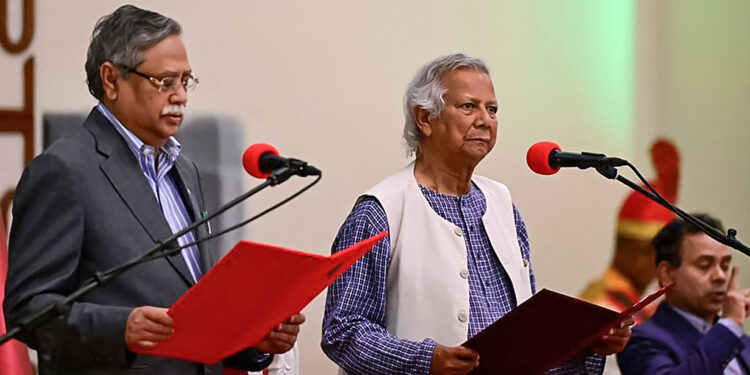
As Bangladesh ushers in a new era of leadership under Nobel Laureate Professor Muhammad Yunus, the world watches with hope and anticipation. His leadership, emerging from a period of student-led protests and political upheaval, symbolizes a triumph of democracy and justice in a region long plagued by strife. But as Bangladesh looks inward to heal and rebuild, there is an urgent call for its new leadership to turn its gaze toward a neighbor in dire need—Myanmar.
Myanmar, once a beacon of hope under the leadership of Nobel Laureate Daw Aung San Suu Kyi, has spiraled into chaos since the military coup in 2021. The nation is now teetering on the brink of genocide, with tens of thousands imprisoned, tortured and executed by a ruthless military regime. Among the imprisoned is Daw Aung San Suu Kyi, the symbol of Myanmar’s struggle for freedom, who languishes in solitary confinement, her fate unknown.
The Rohingya crisis has rightfully drawn global attention, exposing the brutal persecution of a marginalized group. Yet, this tragedy is but one chapter in a much larger story of systemic violence that has afflicted Myanmar for decades. The suffering extends far beyond the Rohingya, affecting various ethnic groups who have long endured the military’s oppression.
Daw Aung San Suu Kyi’s efforts to address these issues were derailed in 2017 when the Arakan Rohingya Salvation Army launched attacks that triggered a military crackdown. Her commitment to peace and justice was clear in her decision to commission a study by the late Kofi Annan, seeking solutions for the crisis in Rakhine State. However, the situation quickly escalated, leading to widespread suffering and displacement.
Prof. Yunus, as Bangladesh’s new leader, holds a unique position of influence. His country shares a border with Myanmar and has been directly affected by the influx of Rohingya refugees. Bangladesh’s leadership can be a powerful force for good, not only within its own borders but also in advocating for the release of Myanmar’s political prisoners and the restoration of democracy.
In a letter sent on Aug. 16, United Nations Secretary-General António Guterres emphasized the urgent need for your government to ensure the protection of all citizens, especially minorities, and to safeguard the well-being of the 1 million Rohingya refugees in Bangladesh. His words are timely, as the only hope for true reconciliation and the safe return of the Rohingya to Myanmar lies in the immediate release of Daw Aung San Suu Kyi and the entire democratically elected government. We believe you hold the key to achieving this historic and noble outcome.
There is a profound crisis of truth in our world today—a crisis exacerbated by misinformation and the distortion of facts. Daw Aung San Suu Kyi has been vilified by many, her legacy marred by accusations of collusion with the military. Yet, evidence strongly refutes these claims. Her speeches and actions over the years, documented in a comprehensive four-volume series by myself and my colleague Fergus Harlow, reveal a leader steadfast in her commitment to justice and democracy.
The situation in Myanmar is escalating. Weapons supplied by global powers like Russia and China are fueling the conflict, pushing the nation closer to the abyss. The world cannot afford to turn a blind eye. It is in this context that I appeal to Prof. Yunus. His leadership in Bangladesh offers a rare opportunity to influence the course of history in Myanmar.
We propose the Ashoka Peace Accords—a call for the immediate release of Myanmar’s democratic leaders and an end to the violence that threatens to engulf the nation. The world is crying out for peace, dialogue and reconciliation—not state-sanctioned murder. This initiative could mark the beginning of a second wave of independence in Myanmar, where truth, dignity and the power of conscience prevail over tyranny.
The assassination of Ko Ni, Daw Aung San Suu Kyi’s lawyer, is a chilling reminder of the stakes involved. His murder, while holding his grandchild in broad daylight, was not just an attack on an individual; it was an attack on justice, freedom and the rule of law. This act of brutality underscores the urgent need for international intervention.
Prof. Yunus has the power to be a catalyst for change in Myanmar. His voice, his influence, and his moral authority can shine a light on the injustices occurring in Myanmar, galvanizing global action. The recent victory in Bangladesh can serve as an inspiration—‚a demonstration of what is possible when courage and conscience come together.
The people of Myanmar, like those in Bangladesh, yearn for freedom, justice, and the restoration of democracy. The release of Daw Aung San Suu Kyi and the thousands of political prisoners rotting in Myanmar’s prisons is not just a necessity for Myanmar’s future—it is a moral imperative for the world.
As Bangladesh navigates its own path forward, may it also lead the charge for justice and freedom in Myanmar. The world is watching, and the stakes could not be higher. This is a moment for bold leadership and unwavering commitment to the principles that unite us all as human beings.
Alan Clements is an author, human rights activist, investigative journalist and former Buddhist Monk and co-author of “Burma’s Revolution of the Spirit: The Struggle for Democratic Freedom and Dignity”.
source : irrawaddy
